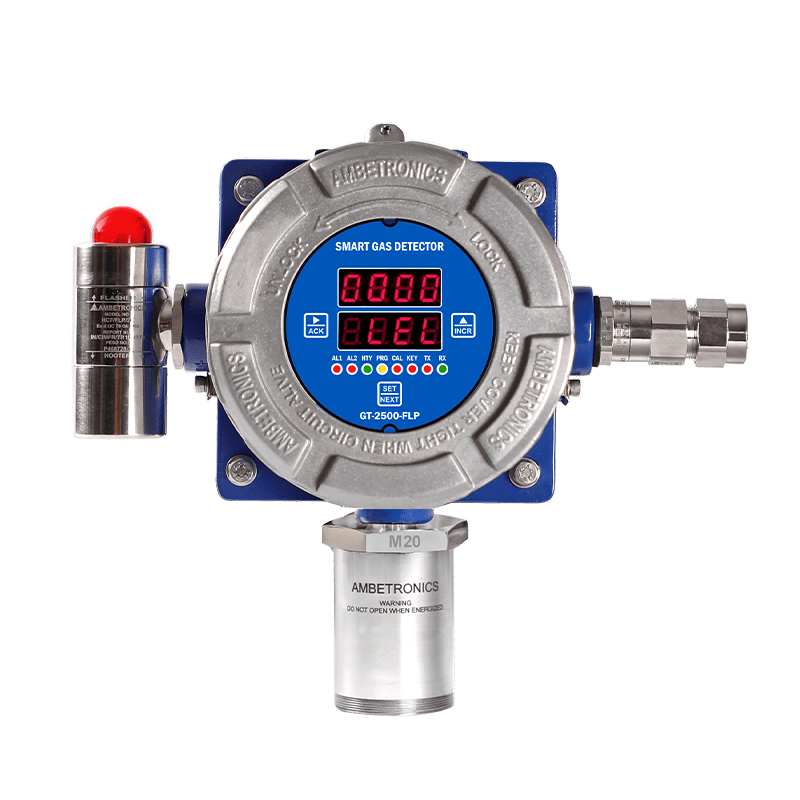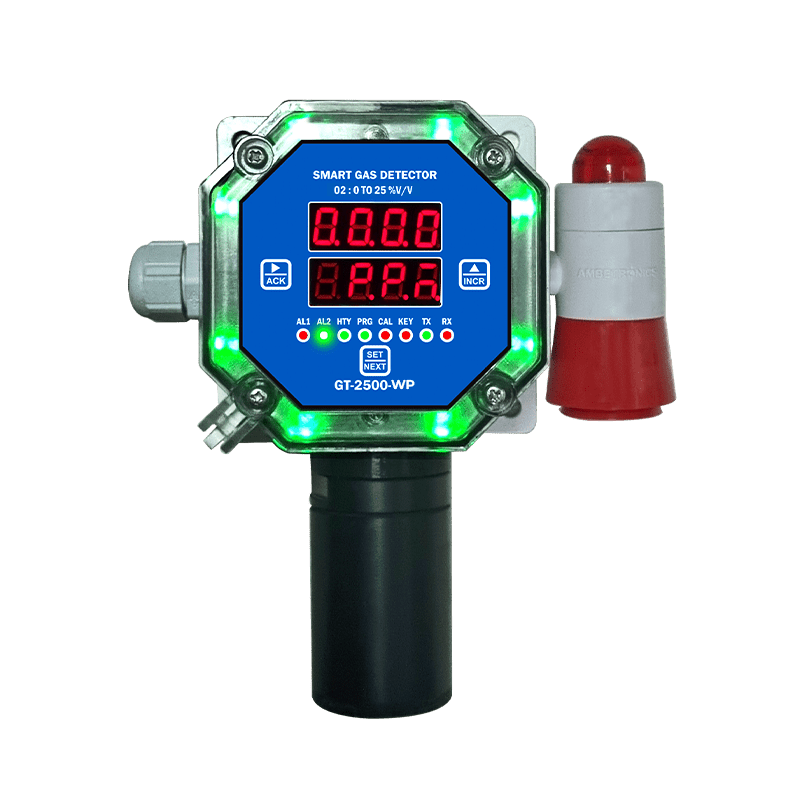Hydrogen Gas Detector for Lithium Battery - Ambetronics Gas Detection Solution
In the dynamic world of energy storage, the Hydrogen Gas Detector for Lithium Battery focus on safety within battery rooms is paramount. While lithium batteries dominate the market, it’s crucial to understand other battery types, such as lead-acid and lithium batteries, to comprehensively address safety concerns.

GT-2500-FLP
Smart Hydrogen Gas Detector with L.E.D Display

GT-2500-WP
Smart Hydrogen Gas Detector with L.E.D Display
Certifications and Compliance





The Hydrogen Gas Detector boasts multiple certifications, including approval for flameproof enclosures (Ex db IIC T6 Gb IP66) and compliance with standards like IS/IEC 60079-1:2014 and IS/IEC 60079-31:2013. These certifications highlight its reliability in challenging industrial environments.
EXPLORE OUR HYDROGEN GAS DETECTOR For Lithium Battery Rooms
Introduction of Safety and Risk in Battery Rooms
Let’s talk about the Importance of Safety in Battery Rooms, Safety is non-negotiable in environments where energy is stored, particularly in battery rooms housing powerful lithium batteries. The risks associated with these batteries demand a proactive approach to safety. Role of Ambetronics Hydrogen Gas Detector for Lithium Battery, Hydrogen gas detectors play a pivotal role in identifying and monitoring the presence of hydrogen gas, a byproduct that poses serious risks if undetected.
Understanding Lithium Batteries in Battery Rooms
What is Inside a Lithium Battery?
Lithium batteries, known for their high energy density and long life, are commonly used in various devices. Understanding their structure and potential risks is essential for safety measures.
Potential Risks Associated with Lithium Batteries
Despite their advantages, lithium batteries can pose challenges, including the release of hydrogen gas, which is highly flammable and potentially explosive.
Lead Acid Batteries
Understanding why hydrogen is gaining prominence and how it offers solutions to challenges posed by conventional fuels and intermittent renewable energy sources.
Lithium Batteries
Exploring the various methods of hydrogen production, including steam methane reforming and water electrolysis, and how these contribute to the evolution of the hydrogen economy.
Other Battery Types
EXPLORE OUR HYDROGEN GAS DETECTOR For Lithium Battery Rooms
The Danger of Hydrogen Gas in Battery Rooms
The production of hydrogen gas during the operation of lithium batteries, especially during charging and discharging cycles, poses a potential danger if not properly managed. Undetected hydrogen gas can lead to hazardous conditions, including explosions. Recognizing the risks and consequences is crucial for implementing effective safety measures.
Early Detection for Safety
Hydrogen gas detector GT-2500-FLP provides early detection of rising hydrogen levels, allowing for swift intervention and prevention of hazardous conditions.
Monitoring Hydrogen Levels
Continuous monitoring ensures timely detection of small leaks or gradual increases in hydrogen concentration, contributing to a proactive safety approach.
Significance of Ambetronics Hydrogen Gas Detector for Lithium Battery - GT-2500-FLP
Fixed Gas Detectors
Installed strategically within the battery room, fixed gas detectors offer continuous monitoring and integration into alarm systems for immediate response.
Portable Gas Detectors
For added flexibility and coverage, portable gas detectors enable spot-checks and routine inspections, enhancing overall safety measures.
Types of Hydrogen Gas Detectors
Proper Placement of Detectors
Strategically placing detectors is crucial for effective monitoring. Understanding optimal locations within a battery room maximizes coverage.
Routine Checks and Calibration
Regular maintenance, including routine checks and calibration, ensures detectors remain accurate and reliable over time, reducing the risk of false alarms or undetected gas leaks.
Installation and Maintenance
Industry Standards
Compliance with industry standards is mandatory for ensuring the safety of battery rooms. Adhering to these standards is critical for responsible operation.
Legal Requirements
In addition to industry standards, complying with legal requirements at local, regional, and national levels is essential for creating a secure and compliant environment.
Regulations and Compliance
Real-Life Incidents
Examining real-life incidents where hydrogen gas detection played a crucial role in preventing disasters underscores the importance of these safety measures.
Success Stories
Highlighting success stories where timely use of hydrogen gas detectors averted potential dangers can inspire others to prioritize safety.
Case Studies
Innovations in Gas Detection
Technological advancements in hydrogen gas detection contribute to more reliable and efficient systems, enhancing overall safety in battery rooms.
Emerging Trends
Exploring the latest trends in gas detection technology provides insights into future possibilities and improvements in safety measures.
Advancements in Technology
Factors to Consider
Technological advancements in hydrogen gas detection contribute to more reliable and efficient systems, enhancing overall safety in battery rooms.
Expert Recommendations
Exploring the latest trends in gas detection technology provides insights into future possibilities and improvements in safety measures.
Choosing the Right Detector
EXPLORE OUR HYDROGEN GAS DETECTOR For Lithium Battery Rooms
Watch Our Hydrogen Gas Leak Detector Video
People Also Search For:
| Hydrogen Gas Detector | ||||||||||||||
| Hydrogen Gas Detector in Battery Rooms | ||||||||||||||
| Hydrogen Gas Detector in Electrolyzer | ||||||||||||||
| Hydrogen Gas Detector in Data Centers | ||||||||||||||
| Gas Leak Detector in Laboratory | ||||||||||||||
| Hydrogen Gas Detector in Hydrogen Generation | ||||||||||||||
| H2 Gas Detector for Lithium Battery | ||||||||||||||
| Hydrogen Gas Leak detector | ||||||||||||||
| hydrogen sensor for battery room | ||||||||||||||
|

